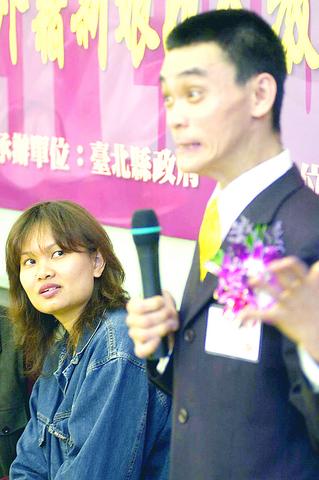The Ministry of Education (MOE) is considering demanding that all foreign brides receive Chinese-language training courses as soon as they arrive in Taiwan, Vice Minister of Education Fan Sun-lu (
"We are considering requiring all foreign brides to study Chinese once they set foot on the island, " Fan said at a seminar on adult education for foreign brides organized by the Taipei county government.

PHOTO: SEAN CHAO, TAIPEI TIMES
Fan said the ministry has also decided to ease restrictions on foreign brides intending to receive higher education in Taiwan. In the future, she said, foreign brides who have obtained permanent residency or Taiwan passports can apply to enter local educational institutions.
Due to the changing social situation, Fan went on, the number of foreign women marrying Taiwan men has increased substantially in recent years.
"We should not discriminate against foreign brides and should treat them with respect and concern," Fan said, adding that educational and welfare service agencies should integrate their resources to help foreign brides get accustomed to Taiwan's social norms, customs, culture and way of life.
As foreign brides play an essential role in child-rearing and education, Fan said, the MOE will cooperate closely with local governments and educational institutes in offering practical educational programs and training workshops for foreign brides.
Speaking on the same occasion, Lin Kuei-chih, academic affairs director of Wanli Elementary School in Taipei County, said that the school began to operate a special education class for foreign brides three years ago.
"At the beginning, the teachers had a hard time communicating with the foreign brides. After three years of effort, however, many of them can speak and read Chinese and can use phonetic symbols and dictionaries," Lin said.
According to government tallies, the number of foreign spouses had reached 91,300 as of the end of last year. Among them, 85,194 were women, while the remainder were men.
If the number of foreign brides increases at an estimated annual rate of 17,000, the number of foreign brides will reach 150,000 in four years, equivalent to the minimum population required to form a city under the jurisdiction of a county government.
In 1998, foreign spouses accounted for 7.13 percent of the people who registered their marriages during the year, a ratio that rose to 11.38 percent in 2001 and surged further to 11.65 percent last year.
A total of 17,339 foreign women married Taiwan men last year, while 2,768 foreign bridegrooms tied the knot with Taiwan women.
In terms of nationality, Vietnamese women formed the largest group of foreign brides in Taiwan, totaling 42,713 at the end of last year; followed by Indonesians at 10,662. Other countries who have at least 1,000 women married to Taiwanese men were Thailand, the Phili-ppines, Cambodia, Japan, Malaysia and the US.

US President Donald Trump said "it’s up to" Chinese President Xi Jinping (習近平) what China does on Taiwan, but that he would be "very unhappy" with a change in the "status quo," the New York Times said in an interview published yesterday. Xi "considers it to be a part of China, and that’s up to him what he’s going to be doing," Trump told the newspaper on Wednesday. "But I’ve expressed to him that I would be very unhappy if he did that, and I don’t think he’ll do that," he added. "I hope he doesn’t do that." Trump made the comments in

NOT AN OPENING: Trump’s violation of international law does not affect China’s consideration in attacking Taiwan; Beijing lacks capability, not precedent, an official said Taiwanese officials see the US’ capture of the president of Venezuela as a powerful deterrent to Beijing’s aggression and a timely reminder of the US’ ability to defeat militaries equipped with Chinese-made weapons. The strikes that toppled Venezuelan President Nicolas Maduro signaled to authoritarian leaders, including Chinese President Xi Jinping (習近平), US President Donald Trump’s willingness to use military might for international affairs core to US interests, one senior official in Taipei’s security circle said. That reassured Taiwan, the person said. Taipei has also dismissed the idea that Trump’s apparent violation of international law could embolden Beijing, said the official, who was not

A cold surge advisory was today issued for 18 cities and counties across Taiwan, with temperatures of below 10°C forecast during the day and into tonight, the Central Weather Administration (CWA) said. New Taipei City, Taipei, Taoyuan and Hsinchu, Miaoli and Yilan counties are expected to experience sustained temperatures of 10°C or lower, the CWA said. Temperatures are likely to temporarily drop below 10°C in most other areas, except Taitung, Pingtung, Penghu and Lienchiang (Matsu) counties, CWA data showed. The cold weather is being caused by a strong continental cold air mass, combined with radiative cooling, a process in which heat escapes from

Snow this morning fell on Alishan for the first time in seven years, as a strong continental cold air mass sent temperatures plunging across Taiwan, the Central Weather Administration (CWA) said. The Alishan weather station, located at an elevation of about 2,200m in central Taiwan, recorded snowfall from 8:55am to 9:15am, when the temperature dropped to about 1°C, the CWA said. With increased moisture and low temperatures in the high-altitude Alishan area, the conditions were favorable for snow, CWA forecaster Tsai Yi-chi (蔡伊其) said. The last time snow fell at the Alishan weather station was on Jan. 10, 2018, while graupel fell there